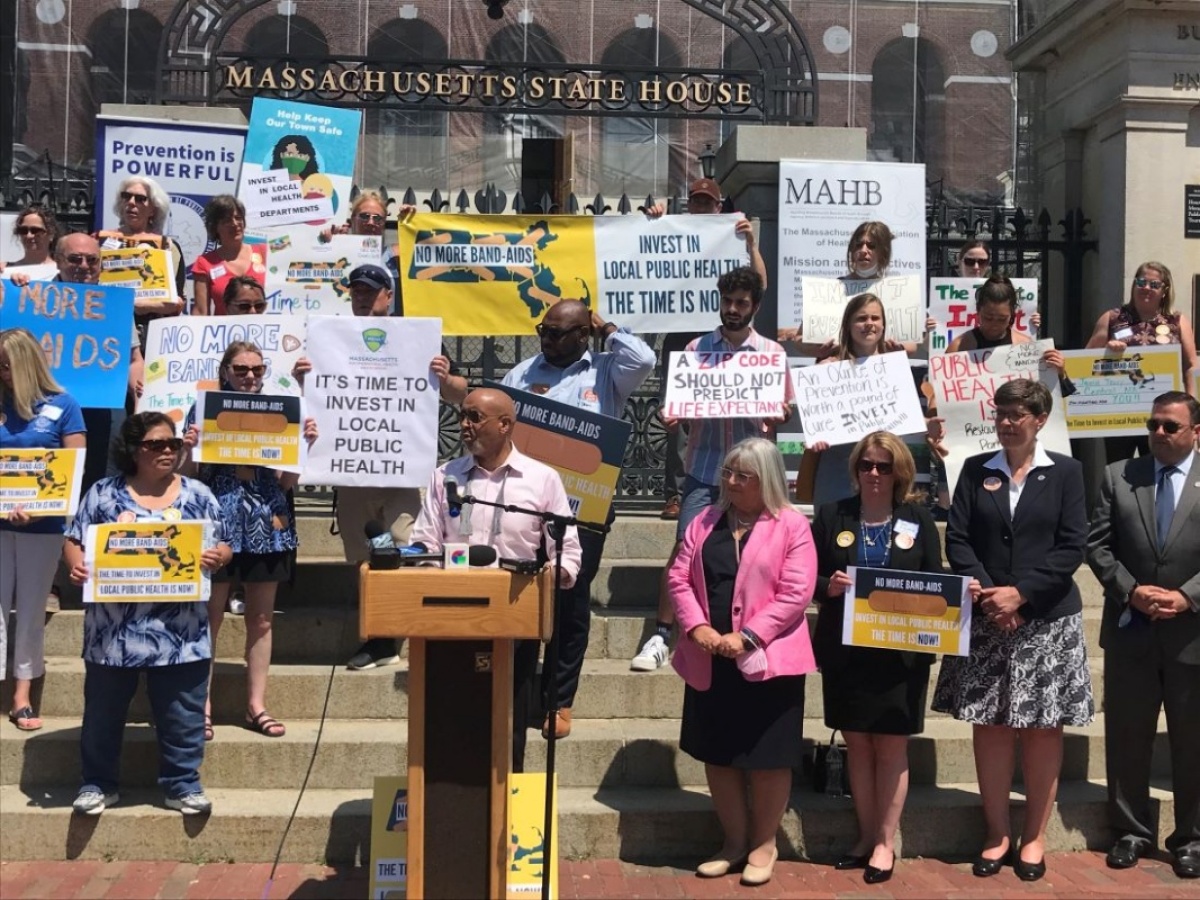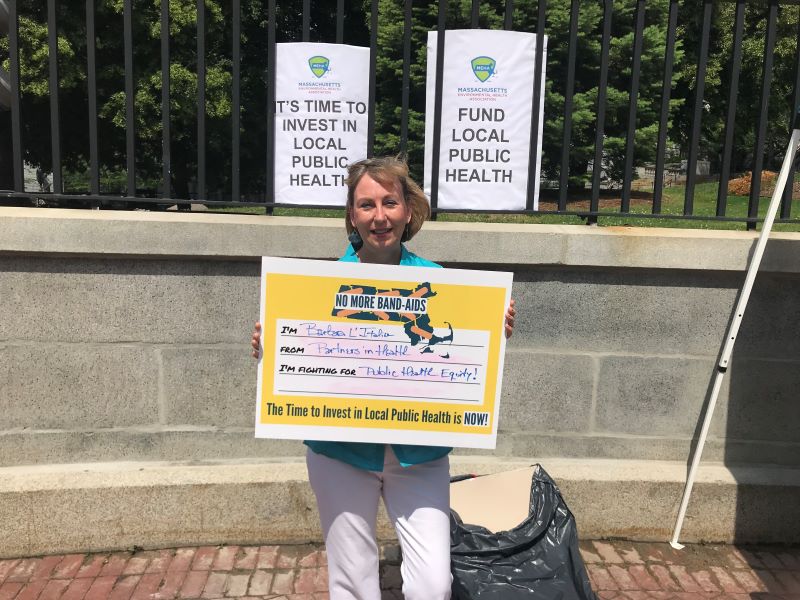Why Massachusetts Needs American Rescue Plan Funds to Fix Local Public Health Systems
PIH advocate shares need to support public health workforce, focus on equity, and garner volunteer support
Posted on Aug 6, 2021

Demanding an end to “Band-Aid” measures that neglect lower-income communities, local health officials and advocates rallied outside the Massachusetts State House earlier this month calling for the state to direct $250 million toward strengthening local public health departments. These funds stem from the American Rescue Plan Act, which passed the United States Congress in March. Barbara L’Italien, Partners In Health’s senior government affairs advisor and a former state legislator, was at the rally. We asked her for what purposes advocates want that money in Massachusetts, and how their plan fits into PIH’s broader vision of reimagining public health systems across the U.S. after the pandemic.
Public health advocates want federal money spent on local health departments in Massachusetts. Where would that money come from?
The money comes from Massachusetts’ over $5 billion portion of the $1.9 trillion American Rescue Plan Act of 2021, signed into law by President Joseph Biden in March. Advocates from the Coalition for Local Public Health and the Massachusetts Public Health Association have asked the state legislature to allocate $250 million to shore up the inefficient and inequitable state public health infrastructure.
How would the money be used?
The proposal would allocate federal American Rescue Plan Act (ARPA) funds over the next five years to upgrade local health departments in Massachusetts. The state has 351 cities and towns, each with its own public health administration, and it’s one of the only states in the nation with no dedicated funding directed to local public health. This has led to major gaps in health spending in local communities, which has taken a toll on lower income individuals and families. The plan calls for spending in three major areas, including $95 million to boost staffing and address health disparities; $37.5 million for workforce development and training; and $118.4 million to enhance public health data systems.
Why is the money needed now?
The COVID-19 pandemic has further exposed long-standing inequities in the health system, with Black, Hispanic, and other communities of color disproportionately impacted by illness and death. Even though lifesaving vaccines are now widely available in the U.S., Black and Hispanic Americans’ vaccination rates are still lagging in almost every state.

How is PIH involved in this effort?
I worked as a supervisor for the Massachusetts Community Tracing Collaborative – a contact tracing workforce launched by PIH at the request of the Commonwealth of Massachusetts in April 2020 -- for six months and then transitioned over to work as an advocate/lobbyist for PIH last October. I have worked with the Coalition for Local Public Health and the MA Public Health Association to ensure that the state would implement the findings of a Public Health Commission to reimagine and strengthen the state’s local public health system so that it is fully capable of addressing future needs. The work is really to bring the Massachusetts system into the 21st century.
My work has included weekly meetings to assist with strategy, training local health members on oral and written testimony with the aim of building support for the legislation within both the state fiscal year budget and the special ARPA funding budget bill. I assisted in planning the rally—from messaging, timing, promotion, outreach to legislators, to management of the event itself. It was really fun to be on the organizational side of an event like this after many years of attending rallies as a state representative and state senator! Post rally, the work is focused on both growing grassroots support to advocate to the broad legislative membership for the ARPA request, while simultaneously meeting with the chairs of the House and Senate Ways and Means committees and preparation for a September ARPA hearing that will focus on health care.
PIH has worked with more than 15 local, county, and state health departments to build up COVID-19 response and partnership, through our U.S. Public Health Accompaniment Unit.
As a part of our efforts, PIH has elevated the voices of partners across the country to help advocate for a stronger investment in the public health infrastructure. These efforts have included joining the National Community-Based Workforce Alliance, co-founding the Public Health Jobs Now! Campaign, and joining the MA Vaccine Equity Now coalition. These efforts have been designed to inform and partner with the Biden administration and allies to ensure that equity is a central part of the COVID-19 response, and that states are leveraging opportunities to expand public health in the hardest hit communities. Now that we are starting to think about post- COVID-19 recovery, we believe it’s critical to strengthen local public health systems so that all communities have access to high-quality health care and support for social needs.
How have communities in Massachusetts been hurt by this lack of funding?
Funding varies for each of the 351 cities and towns in the Commonwealth depending on the relative willingness and ability to financially support public health – from contact tracing to water quality, housing, restaurant, and business inspections. During the COVID-19 pandemic, many communities lacked enough staff, with some relying on elected or appointed health boards with no full-time health professional. The Massachusetts system lacks a cohesive set of uniform standards by which all local boards of health operate and many desired additional pandemic-specific training and local epidemiological expertise. Outreach to communities of color particularly hurt by the pandemic was limited due to staffing and other resource issues. There has been high burn-out due to limited personnel working long hours. Some people have resigned but the vast majority have stayed. And now, public health departments need to be able to hire permanent employees and access technical assistance.
Are any other states mounting similar efforts on behalf of local health departments?
I would assume so, but most states operate county-wide systems. Massachusetts is an outlier in operating 351 separate entities.
What’s the vision beyond the state of Massachusetts?
Our post-COVID-19 work in the U.S. focuses on four major areas: building up the capacity of public health departments to deliver health equity and sustain resilient responses to novel challenges; institutionalize community health workers as core components of a community-based health workforce; strengthen the integration of services addressing social drivers of health -- food, referrals to care and insurance, housing programs, etc. -- within health care across public and private sectors; and elevate community leadership in defining priorities of local health providers in order to improve primary care coverage and available resources. This is a national effort but we need to help make it happen, state by state, community by community.
How can people learn more about this proposal?
More details can be found here.
How can people get involved?
The Massachusetts State Legislature is interested in hearing from individuals, organizations, and experts on how best to allocate the ARPA funds. Public hearings will begin this month and extend into the early fall. Those interested in promoting public health strengthening can submit written testimony to both the Ways and Means Committees of the House and Senate, and the COVID-19 Federal Assistance Committee. Additionally, there are opportunities to sign on to a public letter organized by the MA Public Health Association and Coalition for Local Public Health to connect with your representative and senator via phone or email to urge them to prioritize this funding to bring our public health system in line with 21st century needs.

